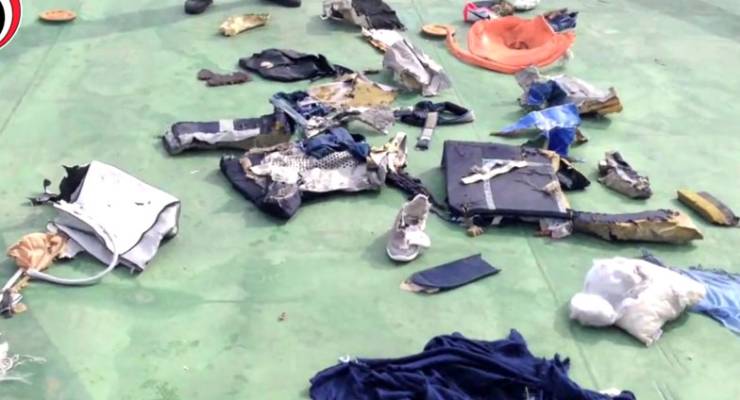
A fire appears to have broken out in the toilet nearest the cockpit of EgyptAir flight MS804 minutes before it crashed into the Mediterranean Sea on a flight from Paris to Cairo on Thursday morning, killing all 66 people on board.
The air safety site Aviation Herald broke the news earlier today, after it confirmed the contents of the Aircraft Communications Addressing and Reporting System (ACARS) data transmissions from the flight via three different sources. (ACARS is an automated flight-performance monitoring system that is routinely used by thousands of airliners as a tool to improve maintenance and operational efficiency.)
The accuracy of the post on the highly respected site has not been challenged.
After more than a day of false leads, wreckage from the missing flight MS804 was found on Friday.
The debris and passenger belongings located 295 kilometres off Egypt’s Mediterranean coast match the point at which the EgyptAir jet disappeared early on the morning of May 19 (local time).
Parts of the jet, an A320, and the persons on board, personal items and cabin fittings are now being recovered from a crash zone about 300 kilometres north of the port city of Alexandria, and a major search for the cockpit voice and flight data recorders has been launched.
In the many news reports from Egypt and Europe, several interesting mentioned elements could prove to be very important as the crash investigation proceeds.
One element is that Greek ATC tried unsuccessfully to make radio contact with MS804 some two minutes 40 seconds before losing radar contact, and that this call was being made as a normal procedure when a flight was about to cross from Greece’s airspace to that of another country, in this case, Egypt.
Why didn’t the pilots respond, and for how long before that call, in the 39 minutes since Greek ATC had spoken to them, might they have been unable or unwilling to respond? That could be an important question, or totally irrelevant, depending on what else the crash investigation discovers.
But caution needs to be used in considering these matters. It is very early in the procedures that could be expected to be followed by the MS804 crash investigation.
It has already been argued that the abrupt change of course seen on Greek radar and the puzzling radio silence just before the flight disappeared would be consistent with some sort of struggle for control in the cockpit of the A320.
However tempting it might be to jump to conclusions about an attempted hijacking of MS804 the truth of the matter would be solved by the successful reading out of the cockpit sound recorder and the multi-channel flight data recorder. These so-called “black boxes” lie somewhere on the floor of a sea that is shallower and less challenging to deal with than the mid-Atlantic or the south Indian Ocean.
Regarding the ACARS data, airline sources have cautioned that a smoke alert could in some circumstances reflect a sudden decompression of the air inside a jet causing the condensation of moisture.
However, the only operational, rather than criminal, action crisis more serious than cabin decompression at high altitudes is a fire, and both require an urgent descent to lower levels. Flight MS804 was observed by Greek military radar as having made sudden course changes and a rapid descent before it disappeared as it was entering Egypt’s air space.
Fire risks have become of increasing concern to airlines worldwide because of numerous cases of lithium-ion batteries igniting in passenger devices like phones, or even worse, within checked underfloor luggage and cargo consignments. All fires in an airliner are difficult to extinguish, but those from current generation batteries have proven even harder to overcome in the few minutes before they can potentially spread far enough to destroy the structural integrity of an air frame.
What happened inside the EgyptAir flight, and how it might be prevented from happening to another airliner is of obvious importance to airlines and their passengers everywhere.
*This article was originally published at Crikey blog Plane Talking








Crikey is committed to hosting lively discussions. Help us keep the conversation useful, interesting and welcoming. We aim to publish comments quickly in the interest of promoting robust conversation, but we’re a small team and we deploy filters to protect against legal risk. Occasionally your comment may be held up while we review, but we’re working as fast as we can to keep the conversation rolling.
The Crikey comment section is members-only content. Please subscribe to leave a comment.
The Crikey comment section is members-only content. Please login to leave a comment.